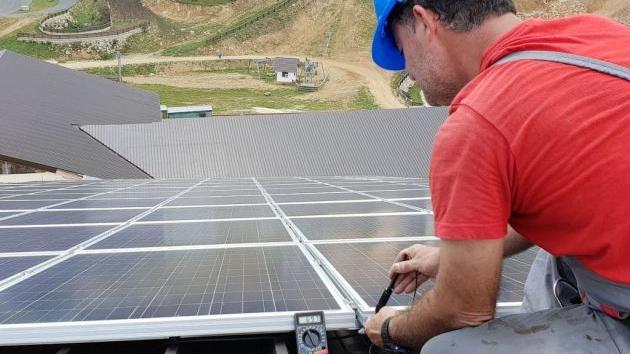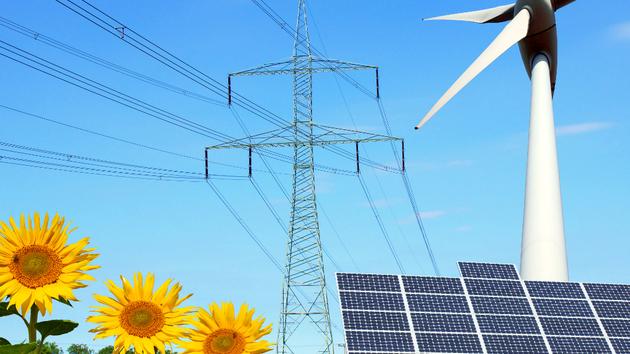RES Serbia 2022: EBRD Wants 50% Green Projects in Serbia, And What Do Local Bankers Say
Source: eKapija
 Tuesday, 20.09.2022.
Tuesday, 20.09.2022.
 09:58
09:58
 Tuesday, 20.09.2022.
Tuesday, 20.09.2022.
 09:58
09:58
(Photo: OIE Srbija/Goran Zlatković)

Whether the growth of the interest rates will influence the financing of RES projects, how banks decide which project to credit, whether the prices of electrical energy will grow – these are the questions discussed by the participants in the panel titled “Financing RES Projects from the Angle of Leading Banks and Bankers”.
The director the EBRD for the Western Balkans, Matteo Colangeli, reminded that the whole Europe was preparing for the winter and that the first step was to save energy.
– That means that we are asking people to accept a reduction in comfort. The second step is energy efficiency, we all want to reduce energy consumption. The field in which we can realize great savings is the reduction of electrical energy costs at big producers – Colangeli pointed out.
According to him, Serbia is very important for the EBRD, which plans to continue investing in our country.
– Our aim is to have 50% green projects in Serbia. In a country like Serbia, the possibilities for increasing the capacities of RES projects are enormous. We do focus on the private sector, but the role of the public sector is very important due to securing clearing conditions for the investors, accelerating the process of the issuing of permits and the construction of new capacities that the private sector cannot build – Colangeli said.
Serbia could have done much more
A co-founder and the CEO for Europe at CWP Global, Dimitar Encev, noted that Serbia could have done much more to develop RES capacities.
– Serbia got off to a good start, didn’t build too many overexpensive solar parks, which is where some countries were wrong. Unfortunately, that good start didn’t continue. Serbia could have done much more. It should work on improving the network and building new capacities – Encev pointed out.
He explained that the global attitude toward RES had dramatically changed, because previously, those projects had been seen as good, but expensive, whereas now they were the only cheap source of new capacities.
– When we were starting out, the business world was our enemy because we were expensive, but the economy is now our ally. We are living in unprecedented times, the capital costs have grown, the interest rates as well, but we all have the mission to develop RES projects – Encev said.
Low energy prices are behind us
A member of the Executive Board of Erste Bank Serbia, Nikola Stamenkovic, revealed that the bank was negotiating with investors that were developing a total of 300 MW worth of projects at that moment.
– We know that the current circumstances are unfavorable, we are importing electricity, and the one we produce, we produce from the least ecological sources. Furthermore, we spend irrationally. On the other hand, the RES potential is measured in EUR 4.5 billion in the next five years – Stamenkovic pointed out.
As he said, the low price of energy is behind us, and the major change in the price of electricity runs counter to the needs of the bank for safe investments.
– In 2019, the price of electricity was EUR 40 per MW, now it’s EUR 400 to EUR 500. That kind of price instability is certainly not bankable. We are now looking for a model that will compromise between the ambitions of investors for high profits and the bank’s needs for safe investments – Stamenkovic concluded.
Saving is necessary
The chairman of the Executive Board of ProCredit Bank Serbia, Igor Anic, does not expect the growth of interest rates to create a problem with the financing of RES projects, and as he pointed out, in making the decision on financing, each project is considered individually.
– Since we started financing RES projects 12 years ago, the technology has become cheaper. We will have plenty of investments in this field, we will follow both the economy and the citizens, and the potential when it comes to the citizens is huge. Also, investments in the training of people who can estimate the needs of the clients are very important – Anic says.
The chairman of the Executive Board of UniCredit Bank Serbia, Nikola Vuletic, estimates that we are used to low interest rates, but that we now need to accept the new reality, which is that the trend of the growth of interest rates will continue.
– It took courage 12 years ago when we started investing in RES projects. Today, we don’t have enough energy to waste, saving is necessary. The potential among the citizens for the development of RES projects is significant, and our role and obligation is to act as a support to the society in using green energy, so banks are partners in this job, and not the competition – Vuletic emphasized.
The RES Serbia 2022 conference was organized by the RES Serbia association, with the support of the European Bank for Reconstruction and Development (EBRD) and the organization WindEurope.
The eKapija portal is one of the media sponsors of the conference.
M. D.
Companies:
 EBRD Evropska banka za obnovu i razvoj Beograd
EBRD Evropska banka za obnovu i razvoj Beograd
 UniCredit Bank Srbija a.d. Beograd
UniCredit Bank Srbija a.d. Beograd
 ProCredit Bank a.d. Beograd
ProCredit Bank a.d. Beograd
 Erste Bank a.d. Novi Sad
Erste Bank a.d. Novi Sad
 Obnovljivi izvori energije Srbije
Obnovljivi izvori energije Srbije
 CWPR Services doo Beograd
CWPR Services doo Beograd
Tags:
WindEurope
Nikola Stamenković
Nikola Vuletić
Igor Anić
Dimitar Enčev
Matteo Colangeli
RES projects
RES Serbia 2022
renewable energy sources
investments in RES
investments
energy saving
energy efficiency
high interest rates
Comments
Your comment
Naš izbor
Most Important News
Full information is available only to commercial users-subscribers and it is necessary to log in.
Follow the news, tenders, grants, legal regulations and reports on our portal.
Registracija na eKapiji vam omogućava pristup potpunim informacijama i dnevnom biltenu
Naš dnevni ekonomski bilten će stizati na vašu mejl adresu krajem svakog radnog dana. Bilteni su personalizovani prema interesovanjima svakog korisnika zasebno,
uz konsultacije sa našim ekspertima.


 Izdanje Srbija
Izdanje Srbija Serbische Ausgabe
Serbische Ausgabe Izdanje BiH
Izdanje BiH Izdanje Crna Gora
Izdanje Crna Gora


 News
News








